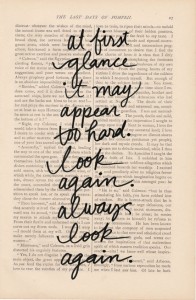Last week in class, we were talking about the media. We talked about what it teaches us, what messages it gives off, why we engage, how it affects us.
As we mulled this all over, someone said something along the lines of “we are taught to be pleasing.” And that’s just it, isn’t it? We are taught to be pleasing– to please others with how we present ourselves, to please others in our relationships with them, to please, please, please.
I am not sure what my preamble was before I came to this but what I left my students with after that comment was this,
“Yes, we are enticed, instructed, coerced into being pleasing rather than particular. But the truth is that for a happy life, for a fulfilling life, for a life of meaning, we need to do just the opposite. We need to be particular rather than pleasing.”
How have you felt the pressure to be pleasing? How are you exercising particularity?




Wow, the framework of “pleasing vs. particular” puts this issue in a whole new light for me!
Not long ago at a work retreat, we did the standard exercise of saying something nice about a co-worker. When my name was called, my co-worker turned to me and said “I just love how go-with-the-flow you are! You’re the ‘drop everything’ girl we can always count on!” At this particular point in time, I was ill, exhausted, and thoroughly burnt out. But all I could think was “Oh good, they like me.”
Somewhere along the line, I think we learn that we have to please others in order to PROVE our worth. I prove my worth by doing everything (being the “drop everything” girl!). How different the world would be if we learned from the start that our own particularity was all the worth we needed?
Two sentences come to my mind: “You’re a good girl” and “Oh, what will people think about us?!”
Being “a good girl” was the compliment I harvested for whatever I did “good”. Was I really ONLY “a good girl” when I washed my teeth, tidied my room, played with my brother, kissed my grandma, came home with good school notation?… As the most usual compliment I received, it taught me it was good ONLY BECAUSE it met expectations of other people – even if I did it for another reason, like: I had fun learning new things, I loved to kiss my grandma, … on the way, I learned to look forward to being a good girl, and forget the other good reasons why I could have done something.
The worst? My mother encouraged us to be creative, supported us when we did something particular – but I learned more through the vocabulary “good girl” than through her positive yet silent support of my particularities.
“What people would think” was the worst thing that could happen when the house was not clean enough, not tidied up enough, we as children would not have immaculate enough clothes on, and so on. My mother was taught this way by her mother. Though the important for my mother was that SHE would feel good, she never learned to express it this way.
As a reaction, as I slowly became aware of the situation (as an almost adult) I tried new things, observed how it felt, what was good (or not good) to ME. I pointed out my particularities or cultivated some. This was the time I wore clothes nobody expected me to wear, I did things just because nobody else did, I discovered that my favorite beverage is violet sirup (I still know quite nobody that knows this beverage!), I began to wear hats (oh, how I love hats!) because nobody would have think it to be cool (though I do!).
I try to compliment my daughter (or myself or whomever) on what she does FOR HERSELF, on the competence/intention: prudent, courageous, curious, creative, organized, whatever. I try to encourage her to feel what is important to her – and I try to respect it even if it does not match with my wishes. I try to banish “what people think” from my vocabulary, because my thoughts are deeper than that, but this is not easy.